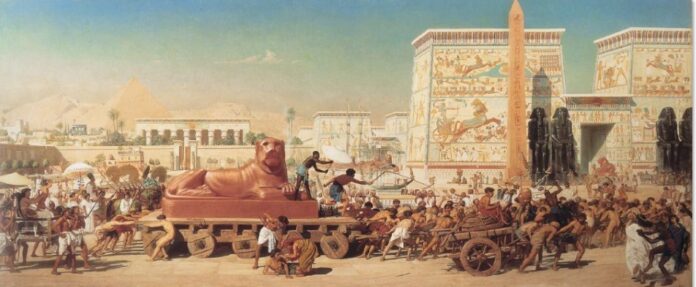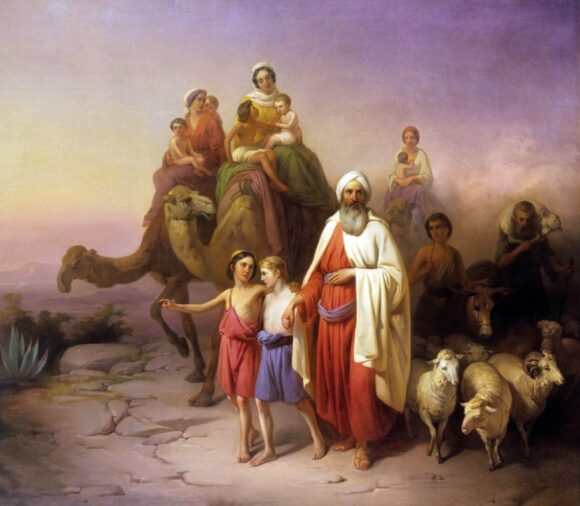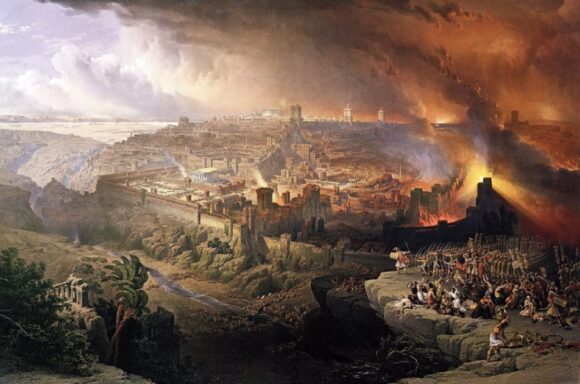MOST CHURCHES have no real interest in the State of Israel. Their view is that the Jews rejected Jesus Christ and consequently were expelled from their land and scattered among the nations of the world, and are no longer part of God’s purpose. Is this right?
The Family of Abraham
The early chapters of the Bible recount the lives of various faithful individuals who found favour in God’s sight—including Abel (Genesis 4:4,) Enoch (5:24), and Noah (6:9).
Then comes a man called Abram, who at the time was living in Ur (in modern Iraq).
Now the Lord said to Abram, “Go from your country and your kindred and your father’s house to the land that I will show you. And I will make of you a great nation, and I will bless you and make your name great, so that you will be a blessing” (Genesis 12:1–2).
The land was Canaan, which we now know as Israel. Abram arrived there accompanied by his nephew Lot. After they had separated, God appeared to Abram again: ‘The Lord said to Abram, after Lot had separated from him, “Lift up your eyes and look from the place where you are, northwards and southwards and eastwards and westwards, for all the land that you see I will give to you and to your offspring for ever”’ (Genesis 13:14–15).
Then God appeared again in a vision: ‘On that day the Lord made a covenant with Abram, saying, “To your offspring I give this land, from the river of Egypt to the great river, the river Euphrates, the land of the Kenites, the Kenizzites, the Kadmonites, the Hittites, the Perizzites, the Rephaim, the Amorites, the Canaanites, the Girgashites and the Jebusites”’ (Genesis 15:18–21). These were in effect unconditional promises of descendants, a land and a blessing.
The Nation of Israel
When Abram was 99 years old God appeared to him again and made great promises: that he would have an offspring, that his name would be changed to Abraham (‘Father of many nations’), and that he would possess the land (17:1–8).
Abraham and his wife Sarah were childless, but when Abraham was 100 years old and Sarah was 90 they finally and miraculously had a child, who was called Isaac (21:1–7). One of Isaac’s sons was Jacob, whose name God changed to Israel (‘Prince with God’) (32:28). His 12 sons became the ancestors of the 12 tribes of Israel. The book of Genesis ends with the family going into Egypt to escape a famine. There they grew into a nation. The next book, Exodus, opens with the nation in slavery.
Under God, Moses led them out of Egypt and through the wilderness to the Promised Land—Canaan. It was Moses’ successor Joshua who led the conquest of the land (described in the book of Joshua).
Initially the nation was governed by judges (narrated in the book of Judges), the last of whom was Samuel the prophet. Then the people requested a king: ‘Then all the elders of Israel gathered together and came to Samuel at Ramah and said to him, “Behold, you are old and your sons do not walk in your ways. Now appoint for us a king to judge us like all the nations’” (1 Samuel 8:4–5). This was a rejection of God, but God told Samuel to comply with their request (vs. 7–8).
First Saul, then David then his son Solomon reigned over the nation; then in the reign of Solomon’s son Rehoboam the kingdom split into two (1 Kings 12). The divided kingdom suffered a spiritual decline, the people and their leaders were persistently disobedient to God, and by the end of the historical books of Chronicles both kingdoms had been destroyed and their people taken into captivity.
The New Testament
By the time Jesus Christ was born at the opening of the Bible’s New Testament, the Israelites were known as Jews and their land was a province of the Roman empire. They were rebellious and troublesome. Jesus was the Son of God and King of the Jews (Luke 1:26–33), but his people rejected him and had him put to death. His crucifixion and resurrection took place around 30 ad, and 40 years later the Roman armies destroyed Jerusalem. The Jews were again driven out of their land. All this happened because of the Jews’ persistent unfaithfulness to God and their rejection of His Son.
Jesus had prophesied: ‘When you see Jerusalem surrounded by armies, then know that its desolation has come near. Then let those who are in Judea flee to the mountains, and let those who are inside the city depart, and let not those who are out in the country enter it, for these are days of vengeance, to fulfil all that is written’ (Luke 21:20–22).
‘All that is written’ were the many Old Testament prophecies, for example: ‘Whereas you were as numerous as the stars of heaven, you shall be left few in number, because you did not obey the voice of the Lord your God. And as the Lord took delight in doing you good and multiplying you, so the Lord will take delight in bringing ruin upon you and destroying you. And you shall be plucked off the land that you are entering to take possession of it. And the Lord will scatter you among all peoples, from one end of the earth to the other, and there you shall serve other gods of wood and stone, which neither you nor your fathers have known’ (Deuteronomy 28:62-64).
The land that had flowed with milk and honey (Numbers 13:27) became a wasteland: ‘And I will scatter you among the nations, and I will unsheathe the sword after you, and your land shall be a desolation, and your cities shall be a waste’ (Leviticus 26:33).
Regathering
The Old Testament prophets foretold the destruction of Jerusalem and the scattering of the Jews, but also that they would survive as a distinct people: persecuted and oppressed, but not assimilated and not destroyed: ‘Fear not, O Jacob my servant, declares the Lord, for I am with you. I will make a full end of all the nations to which I have driven you, but of you I will not make a full end. I will discipline you in just measure, and I will by no means leave you unpunished’ (Jeremiah 46:28).
The prophets also foretold that the Jews would be regathered: ‘For the children of Israel shall dwell many days without king or prince, without sacrifice or pillar, without ephod or household gods. Afterwards the children of Israel shall return and seek the Lord their God, and David their king, and they shall come in fear to the Lord and to his goodness in the latter days’ (Hosea 3:4–5). This prophecy indicates that this regathering will be related to the second coming of the Lord Jesus Christ. As the angel told his mother Mary, ‘Behold, you will conceive in your womb and bear a son, and you shall call his name Jesus. He will be great and will be called the Son of the Most High. And the Lord God will give to him the throne of his father David, and he will reign over the house of Jacob for ever, and of his kingdom there will be no end’ (Luke 1:31–33).
Today we see the Jews regathered in the land of Israel. They are largely godless and unbelieving, just as the Bible prophesied, but we’re told that when Jesus returns they will acknowledge him:
I will pour out on the house of David and the inhabitants of Jerusalem a spirit of grace and pleas for mercy, so that, when they look on me, on him whom they have pierced, they shall mourn for him, as one mourns for an only child, and weep bitterly over him, as one weeps over a firstborn (Zechariah 12:10).
Christadelphians are not supporters of the present state of Israel. However, we watch it carefully because it is clear that the Jews still have a key role in God’s purpose with the world.
Paul Downer




